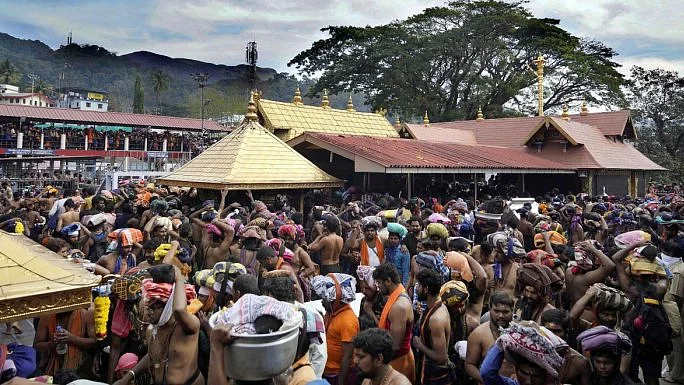Post Ayodhya judgment, Ayyappa devotees hopeful of a ‘favourable’ SC verdict today
With apex court due to deliver its verdict in a few hours on review petitions challenging its earlier order to permit entry of women of all ages into Sabarimala temple, petitioners’ hopes are high

With the Supreme Court applying the principle of ‘the heart, mind and healing’ in its Ayodhya verdict, Ayyappa devotees are hoping for the court to deliver a favourable judgment on a spate of review petitions on Thursday.
The challenged verdict, which allowed women of all ages to enter the Sabarimala temple, traditionally closed for women of productive age, had divided the devotees with the vocal among them defending the ancient tradition.
They have been arguing that the court can do that without compromising constitutional morality by using its powers under Article 142, as was done in the Ayodhya case, to order the central government or the state government to enact a law that will restore the special status of the Sabarimala temple to reflect its uniqueness.
The Supreme Court by a majority 4:1 judgment had in September last year permitted the entry of women of all ages to the Sabarimala temple on the ground that ‘devotion cannot be subjected to gender discrimination’ and that the temple could not claim any exemption from the rituals and practices in other places of worship as it is managed by the same administrative set-up that ran the other temples.
It was Justice Indu Malhotra, the lone woman member of the bench, who expressed dissent, arguing that matters of faith cannot be subjected to intervention by the state. Now that view has the backing of the Ayodhya verdict.
The Sabarimala temple is steeped in antiquity and to give it an identity on the basis of a statutory board that came into being only in 1950 is preposterous, argue the devotees.
Unlike other temples in Kerala, Sabarimala gives access to all those who believe in Lord Ayyappa and the practices followed in the temple. Sabarimala is the only temple which allows entry to non-Hindus and secularism is basic to its doctrine.
Long before the Father of the Nation preached temple entry for all untouchables, this ancient temple stood as a beacon light and guidance to the whole of India. For example, the members of the lowest caste and the high caste Brahmin rubbed shoulder and offered prayers in this ancient temple. Non-Hindus also offered prayers at Sabarimala and in fact the temple has deep-rooted connections with churches and mosques.
Acquiesance to Vavar, who was supposed to be a Muslim commander of Ayyappa’s army, at a mosque at Erumeli, which forms the gateway to Sabarimala from the other side of River Pampa on the foothills, is part of the rituals of Sabarimala.
They also argue that the Sabarimala temple does not need any grant from the government to run it as it collects huge amounts by way of offerings from the devotees. In fact, Sabarimala contributes huge amounts to the state coffers and the money earned by the temple is used to run other temples.
In Sabarimala, Ayyappa is an eternal bachelor who does not wish to be in the company of women of reproductive age. That is his choice or, the choice ascribed to him by his worshippers over centuries.
Follow us on: Facebook, Twitter, Google News, Instagram
Join our official telegram channel (@nationalherald) and stay updated with the latest headlines
Published: 13 Nov 2019, 8:45 PM